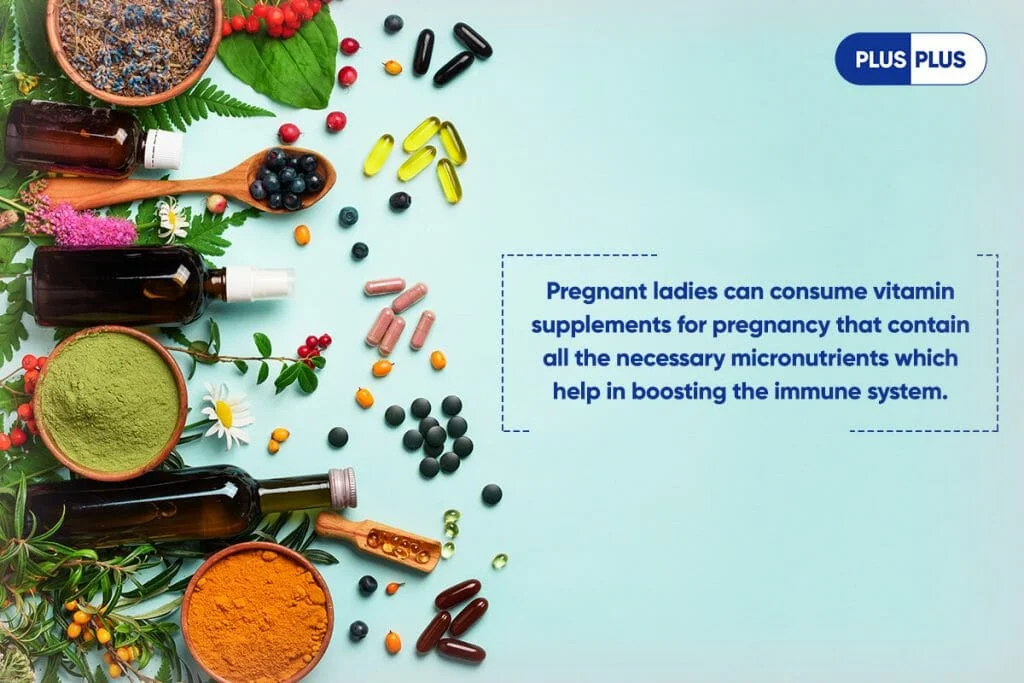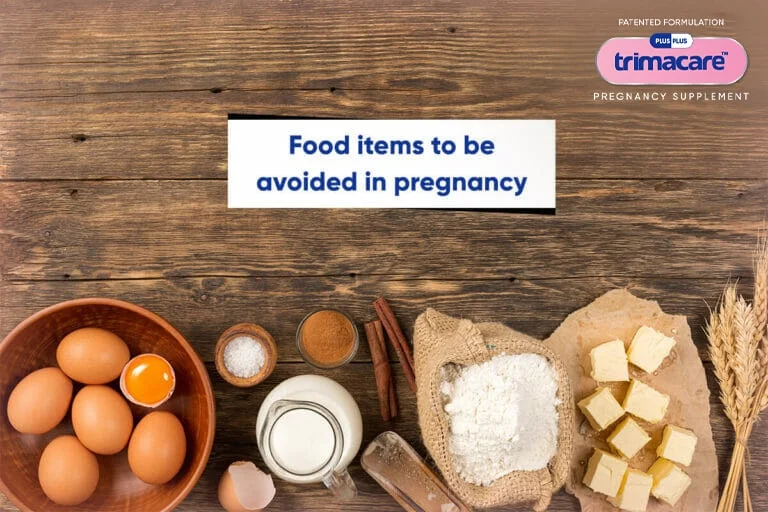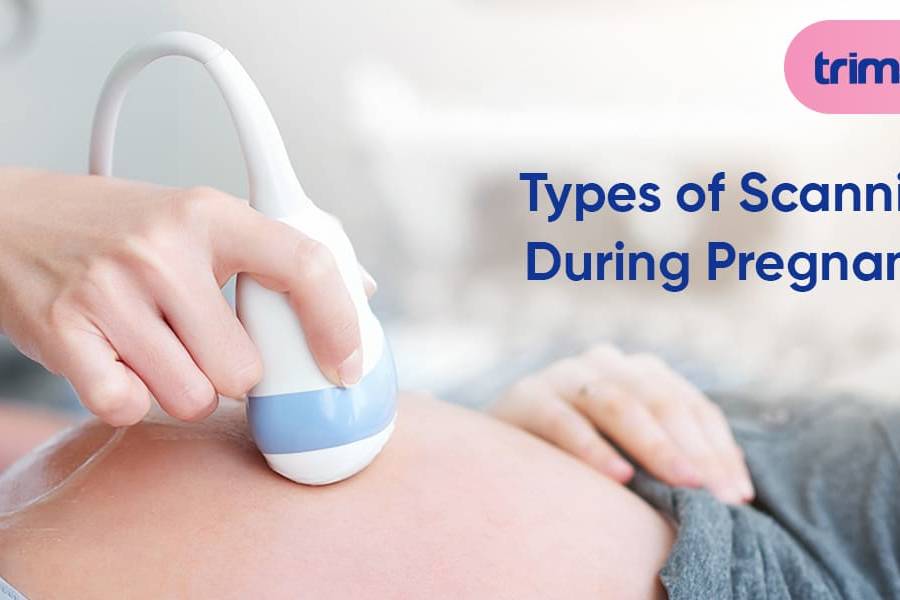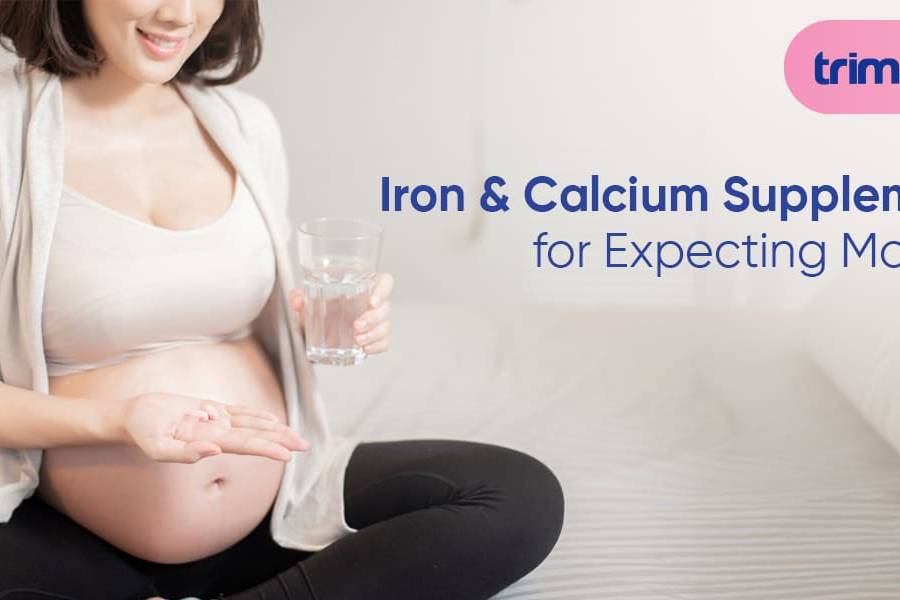Pregnancy is a beautiful experience full of anticipation, excitement and a small dose of anxiety. Along with many concerns, nutrition ranks high on the list. Food choices during pregnancy may have a direct effect on the baby’s and mother’s health. Though there are plenty of healthy foods for pregnant women, it’s also crucial to understand which foods to avoid eating during pregnancy.
Your body undergoes a series of changes throughout pregnancy and your immune system becomes more vulnerable. This indicates some foods not to eat while pregnant can lead to risks anywhere from mild annoyance to serious complications. This blog will help you understand the foods to avoid eating during pregnancy, especially in the first trimester and lead you towards making health-conscious choices.

What should you avoid when pregnant?
- Raw or undercooked meat
One of the most important pregnancy foods to avoid is raw and undercooked meat. It could contain parasites such as Toxoplasma gondii or bacteria such as Salmonella and Listeria, which are known to produce serious infections and even miscarriage. Make sure that the m cooked meat. Always cook meat thoroughly to a safe internal temperature before eating.
- Unpasteurized milk
Soft cheeses such as brie, camembert, blue cheese and unpasteurized milk may contain Listeria, a dangerous bacterium. These are definite foods to avoid during pregnancy since they can cause listeriosis – a condition that can lead to premature birth or stillbirth. Use only pasteurized dairy products as healthy food for pregnant women.
- High-Mercury fish
Fish is usually a good food for pregnant women due to its omega-3 fatty acids, which are beneficial for the foetal brain growth. Fish with high mercury content such as shark, swordfish, king mackerel and tilefish are foods to avoid while pregnant.
Mercury can harm the developing brain and nervous system of the baby. Avoid eating such high-mercury fish and instead opt for safer fish such as trout, sardines and salmon.
- Raw Eggs
Raw or undercooked eggs may contain Salmonella, leading to food poisoning. Vomiting, diarrhoea and fever may occur in the mother and baby. They render foods such as homemade mayonnaise, hollandaise sauce and raw cookie dough foods to avoid during pregnancy. Scramble eggs until both the whites and yolks are set.
- Excess caffeine
While low levels of caffeine are safe, too much caffeine is one of the foods to avoid when pregnancy first trimester since it’s associated with miscarriage and low birth weight. Restrict yourself to approximately 200 mg per day around one 12oz cup of coffee. Don’t forget, caffeine is also present in chocolate, tea and soft drinks.
- Alcohol
Alcohol is a definite food to be avoided in early pregnancy and all stages of trimesters. Alcohol causes Foetal Alcohol Spectrum Disorders (FASD), leading to development problems, learning disabilities and behavioural issues. There is no known ‘safe’ amount of alcohol intake during pregnancy, so it is better not to take it at all.
- Unwashed vegetables and fruits
While vegetables and fruits are considered healthy foods for pregnant women, unwashed produce may have harmful bacteria and parasites like Toxoplasma. Always wash fruits and vegetables under running water to minimize risks. Peel or cook them whenever possible.
- Some herbal teas and supplements
Not everything labelled as ‘natural’ is safe to eat during pregnancy. Certain herbal teas and supplements have chemicals that can cause uterine contractions or harm foetal development.
Teas with pennyroyal, liquorice root or ginseng are examples. These are certain foods to avoid during pregnancy unless cleared by a doctor.
- Processed junk food
Pregnancy cravings are true, but frequent consumption of highly processed foods, sweetened drinks and fried foods contributes to unhealthy weight gain and gestational diabetes. These are not only bad foods during pregnancy, but they contain less or no nutritional value. Substitute them with good foods for pregnant women such as nuts, fruits and whole grains.
- Liver and organ meats
Although the liver has high iron and vitamin A contents, excessive amounts of vitamin A (particularly animal-based) will lead to birth defects. Organ meats are among the foods not to eat while pregnant or at least be eaten in utmost moderation. Have your doctor clear them for use before incorporating them into your diet.
- Sprouted Raw vegetables
Raw sprouts such as alfalfa, clover, radish and mung beans can be contaminated with E. coli or Salmonella. Their moist conditions are a perfect breeding ground for bacteria and hence are high-risk foods to avoid eating when pregnant. Cook sprouts well to minimize risk.
- Excess sugar and artificial sweeteners
Too much sugar can lead to gestational diabetes and excess weight gain. Some artificial sweeteners are not safe either. These are less popular but no less significant foods and fruits to avoid during pregnancy. Opt for natural sweeteners such as honey in moderation and emphasize nutrient-dense whole foods.
Safe alternatives to cravings in pregnancy
Cravings are normal and quite usual, but one must handle them sensibly, particularly in the case if foods to be avoided during pregnancy.
Craving for soft cheese? Opt for pasteurized cheese substitutes that come under healthy food for pregnant women. For sweet cravings, replace sugary food with dates or fruits rich in natural sugar. These are healthy foods for pregnant women without harming their health in pregnancy.
These alternatives not only fulfil your appetite but also fall on the safe food list for pregnant women. Paying attention to such options promotes total nutrition and balances food to eat and avoid during pregnancy well.
Hidden Ingredients to Avoid during Pregnancy
Processed foods contain hidden ingredients that are pregnancy food to avoid. Deli meats, packed snacks or flavoured beverages tend to have nitrates, MSG, high sodium and pasteurised additives. These are considered foods to avoid while pregnant, although they might not appear harmful at first glance.
Also, certain ‘natural’ or ‘herbal’ products have ingredients that cause uterine contractions or influence the foetal growth.
Always read the label carefully when choosing food during pregnancy and avoid anything that you don’t know or that appears too chemical. Knowing what foods not to eat while pregnant makes your diet safer overall.
Immunity booster for pregnant women
It is important for women to maintain high levels of immunity during pregnancy. But what to take for enhanced immunity is a big question.
Pregnant women must take pregnancy supplements containing all the nutrients essential during pregnancy. Hence, opting for the best prenatal multivitamin tablet during pregnancy is significant.
TrimacareTM prenatal vitamin is designed by renowned doctors, pharmacologists and nutritionists adhering to the guidelines of ICMR and WHO. Trimacare prenatal vitamin contains over 20+ essential nutrients in a single pill including folate, iron, calcium, vitamin D, omega-3 and zinc, among all the nutrients needed during pregnancy.
Thus, pregnant women no longer need multiple pills to meet their nutritional needs. It is a 100% vegetarian supplement, suitable for women following a vegetarian diet during pregnancy.
Frequently Asked Questions:
- What foods should I avoid during pregnancy?
Swordfish and shark, which are high in mercury, as well as unpasteurized dairy products, raw or undercooked meats, and deli meats, should be avoided.
- Can I eat sushi while pregnant?
Due to the potential mercury content of some fish and the risk of food-borne illnesses, it is generally advised to avoid sushi during pregnancy.
- Is it safe to consume caffeine during pregnancy?
It’s ideal to restrict caffeine consumption during pregnancy to something like 200 mg each day, which is around one 12-ounce mug of espresso.
- Are there any fruits or vegetables to avoid during pregnancy?
While most products of the soil are protected to eat during pregnancy, it’s critical to wash them completely to eliminate any likely microorganisms or pesticides. Juices and sprouts that have not been pasteurized should be avoided because they may increase the likelihood of foodborne illness.













